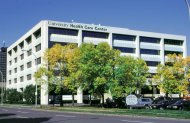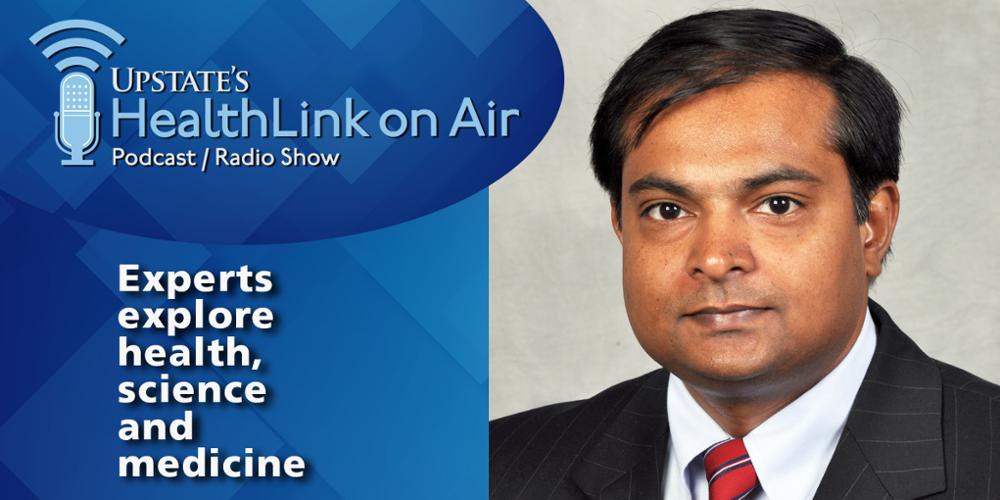Sarcoidosis Program

Upstate Health Care Center
Google Maps & Directions
2nd Fl. Firm C
90 Presidential Plaza, Syracuse, NY 13202
Phone: 315 464-3835
Fax: 315 464-3837
| Hours: | Tuesdays 1:00 PM to 5:30 PM |
 Sarcoidosis Support Group of CNY
Sarcoidosis Support Group of CNY
What causes Sarcoidosis?
Despite extensive research in the field of Sarcoidosis, we have not been yet able to pin point the exact cause of sarcoidosis. However, the exposures to mold/mildew, employment in agricultural and pesticide using industries have been associated with the increased risk of sarcoidosis. Clusters of sarcoidosis cases have been reported in ship workers, fire fighters and rescue workers who responded to the attacks on the World Trade Center
What affects the incidence of sarcoidosis?
The disease can affect people of every race, sex and age. Sarcoidosis is more common in African-Americans, and those of German, Irish, Scandinavian, Asian and Puerto Rican origin. It appears most often in young people between 20 and 40 years of age. It is slightly more common in women than men.
Does it run in family?
There is 4 to 9% increased risk of sarcoidosis if someone’s parents or sibling has or had it.
What are the signs and symptoms of Sarcoidosis?
About 50% patients with sarcoidosis have no symptoms at the time of diagnosis. Disease of asymptomatic patient is incidentally discovered on chest X-ray done during routine physical exam or on CT scan /X-ray done for some other reason.
In symptomatic patient, most common symptoms are cough, shortness of breath, chest tightness, chest pain. Other symptoms could be weight loss, fever, loss of appetite, depression, night sweats. Patients can also have other organs specific symptoms like:
- Skin: bumps, ulcers, flat, discolored skin lesions,
- Eye: blurring of vision, pain, itching and redness in eyes
- Heart: palpitation, passing out, shortness of breath, leg swelling
- Brain & Nerves: Headaches, vision problems, seizure, weakness or numbness of an arm or leg, drooping of one side of the face, tingling, numbness
- Lymph Nodes: Enlarged lymph nodes, feels like lumps in neck, groin
- Liver: Fatigue, jaundice
How is Sarcoidosis diagnosed?
The diagnosis of sarcoidosis can be complex and challenging. The diagnosis is usually confirmed by biopsy of the affected organ. However, biopsy of some of the vital organs like eye, heart or brain may not be easy and possible. In that case we look for another organ sites ((most commonly of the lungs or lymph nodes or skin lesions) which can easily be biopsied.
Apart from biopsy, provider may also perform pulmonary function test to assess extent of lung damage, some blood test to assess kidney function, calcium level, liver function test, eye exam, electrocardiogram to asses heart, brain MRI.
How is it usually treated?
Not everyone who gets diagnosed with sarcoidosis needs to be treated. The reason is that, the medications used to treat sarcoidosis have several side effects and as mentioned before, about 50% of patients with sarcoidosis do not have symptoms at the time of diagnosis and their sarcoidosis resolve spontaneously over next 2-3 years without treatment. Treatment with medications is started only for those patients who show significant sign & symptoms, or significant organ function impairment on tests. The patients who do not meet criteria to start treatment, are followed closely with serial breathing test, blood test and chest X-ray for worsening. Medications used to sarcoidosis are corticosteroid (prednisone) and other immunosuppressive medications (Methotrexate, Azathioprine, Mycophenolate, Hydroxychloroquine, Infliximab). The immunosuppressive medications are used in the patients whose disease is not controlled with lower dose of prednisone or they are having side effects of prednisone.
What course sarcoidosis can take in a patient?
The course of sarcoidosis varies greatly among people.
In majority of cases, sarcoidosis is asymptomatic or has mild symptoms. Symptoms may go away or if asymptomatic, chest X-ray may become normal within a few years without treatment.
Some patients can have moderate form of sarcoidosis, in which inflammation remains but does not worsen. People with moderate sarcoidosis may have symptoms or flare-ups and only need treatment at times.
The severe form of sarcoidosis slowly worsens over a period of years, and can cause permanent organ damage. Treatment can help, but the disease may still leave scar tissue in the lungs, skin, eyes or other organs. About 1/3rd of people with pulmonary sarcoidosis end up with permanent lung damage. For some patients, sarcoidosis can become chronic, lasting for many years.
What kind of doctor would specialize in sarcoidosis?
Sarcoidosis is most often treated by Pulmonologist and Rheumatologist. However, a patient with sarcoidosis in multiple parts of body can be better treated by Sarcoidosis expert at a Comprehensive Sarcoidosis care center which includes a group of doctors from different specialists (pulmonologist, ophthalmologist, rheumatologist, cardiologist, neurologist, dermatologist) working together to make treatment decision for the patient. We provide comprehensive Sarcoidosis care at Upstate Medical University.
How important is a Sarcoidosis support group?
Sarcoidosis is a disease that a lot of people have not heard of it. So, if a person gets this diagnosis, he or she may feel alone. In that case, joining a support group may help that patient to deal with sarcoidosis by talking with and learning from others who have had similar experiences. We have Sarcoidosis support group program in CNY organized by local sarcoidosis patients.
Sarcoidosis Patient Liaison:
Maryann Carney, RNDirect Line: 315-464-2778
Fax: 315-464-3837
Providers

315 464-3833
Diseases/Specialties/Treatments: Dermatology; Dermatopathology; Mohs Microscopic Surgery; Actinic Keratosis; Allergic Reactions; Atopic Dermatitis; more
Education: SUNY Health Science Center at Syracuse
- National Conferences
- Medical Staff Lectures
- Community Lectures
- Medical Student & Intern Education

315 464-8668
Diseases/Specialties/Treatments: Internal Medicine; Gastroenterology; Transplant Hepatology; Alcoholic Fatty Liver; Ascites, Malignant; Chronic Hepatitis; more
Education: St. John's Medical College, Bangalore University, India
Associations/Memberships: American College of Gastroenterology (ACG); American Gastroenterological Association; American Association for the Study of Liver Diseases (AASLD)

315 464-3836
Diseases/Specialties/Treatments: Internal Medicine; Rheumatology; Allergy; Arthritis; Bursitis; Dermatomyositis; more
Education: Chittagong Medical College, Bangladesh

315 464-3835
Diseases/Specialties/Treatments: Internal Medicine; Pulmonary Diseases; Critical Care Medicine; Asthma; Bronchiectasis; Chronic Obstructive Pulmonary Disease (COPD ); more
Education: B. P. Koirala Institute of Health Science, Dharan, Nepal
Sarcoidosis
Sarcoidosis
Pulmonary Artery Hypertension

315 464-5253
Diseases/Specialties/Treatments: Ophthalmology; Autoimmune Disease; Cataract; Eye Allergy; Eye Infections; Glaucoma; more
Education: SUNY Upstate Medical University
Resident Education
Ocular Inflammatory Disease


